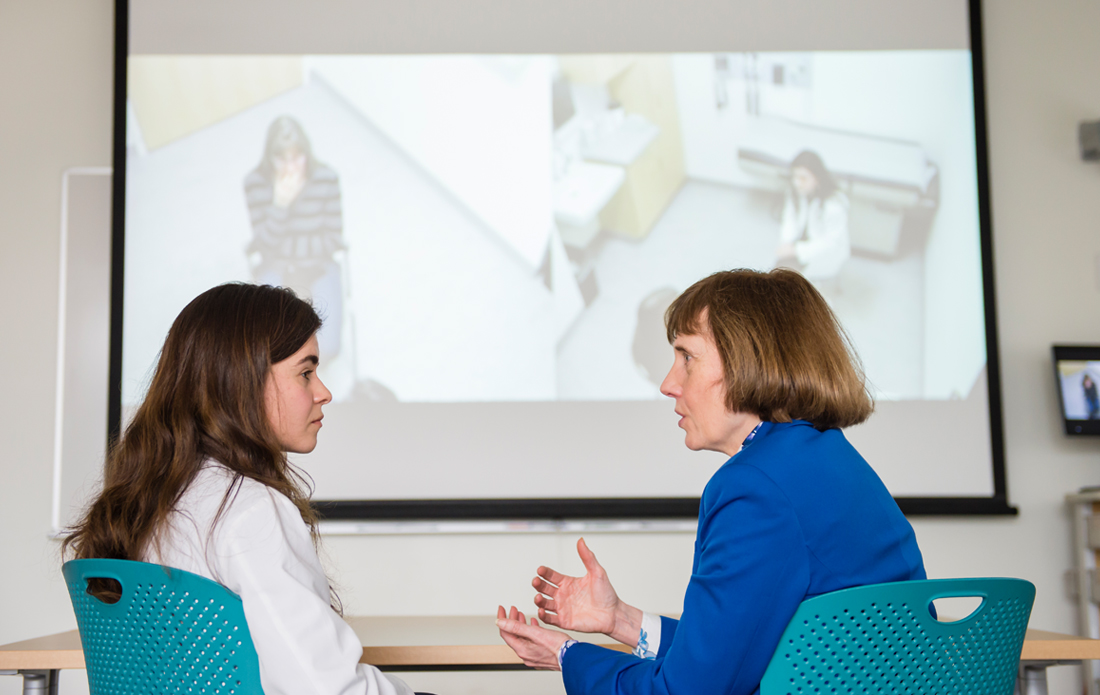Susan Tolle, MD, has spent her career as one of the leading voices for end-of-life and compassionate health care. Her vision and commitment to ethics led her to establish the OHSU Center for Ethics in Health Care, which is celebrating its 30-year anniversary.
We recently asked her a few questions about her career, the center and the future of ethics in health care.
What led you to pursue a career in ethics?
One of the pivotal moments for me was a particularly distressing experience that happened when I was still in training as a third-year medical student.
That day I witnessed the death of a baby with widespread cancer and was doing my best to provide support to the devastated parents moments after their baby died. As I stood respectfully with them in a small room next door to the intensive care unit while they grieved, a tear rolled down my cheek in empathy for the tremendous suffering of this family.
At that moment, an attending physician walked by the open door and looked into the room, noting my expression of caring as I gave the family a hug. As he moved past the door I was shocked to hear him to say to my supervising resident: “She’ll never make it in medicine.”
That was a defining moment for me. I knew in my core that we had to do better than this. We had to consistently bring more humanity to health care to treat patients and their families with the compassion they needed and deserved.
I still think about that moment, about that family and how my empathy was seen as a failing. That moment forged my commitment to ethics and the need to put compassionate communication at the forefront of patient care.
You and your colleagues established the Center for Ethics in 1989. When it started, what did you envision for its future?
When we started the center, our vision was much more modest than the successes we have gone on to achieve. We started with an office the size of a closet and were beyond ecstatic when we received our first $500,000 grant from the Meyer Memorial Trust to begin our work. At the beginning, our focus was simply on improving health care in Oregon. We knew how important it would be to work with a multidisciplinary approach, and the four academic founders of the center — Michael Garland, D. Sc.Rel., Virginia Tilden, R.N., D.N.Sc., Gary Chiodo, D.M.D., and myself — brought an expansive vision of how to do this.
It seemed like an ambitious plan then to think about how different disciplines might come together to improve care, and at the time it was quite revolutionary. But we never imagined that we would go on to expand this vision in multiple ways to become a nationally recognized leader in end-of-life care, and set a high standard for training students in compassionate communication. Since then our programs have been adopted throughout the nation and far beyond.
What is one thing that has surprised you during your career?
The biggest and most uplifting surprise for me has been the extraordinary power of a group of people when they come together with shared purpose — how much can be achieved with a common goal and a willingness to work in partnership. In every aspect of our work we know how important it is to listen to all the stakeholders, to learn from each other, and build consensus as we move forward. Policy and system change can only happen when all voices are heard and the most important factor is always a commitment to the care of the patient.
The POLST program is a remarkable example of what happens when people from competing health care systems and across the health care disciplines bring their vision and expertise to a single task: in this case, honoring the health care wishes of seriously ill patients as they move across settings of care. This program is now used throughout the nation and in parts of 20 different countries worldwide. I have discovered that truly profound things can be achieved when people put aside organizational differences and work together to embrace a common goal.
What are the most pressing issues facing the health care landscape today with regard to ethics? And how do you think the center is poised to address them in the future?
There is — and will forever be — no shortage of issues for the center to address. One of the most important we see now is the need to bring the human element, which can be so easily eclipsed by technology, into every aspect of health care across the life span.
We recently designed a new program to train pharmacy students in communication skills to be more assertive with physicians when patient safety is at stake. And we will be expanding our program in compassionate communication in future years to include even more health care disciplines and care settings.
Our goal is to ensure that patients are treated with compassion and respect, and are empowered to become partners in their own care, in every health care encounter they have. This means more training in compassionate communication skills, both to students and practicing health care professionals; more effective mentoring; and more outreach around the state to impact and partner with other health care systems.
A second issue that we see to be of increasing importance is conflict of interest, which threatens the integrity of health care in countless ways. As we work to combat the insidious effects of this issue on so many aspects of health care, it will be more critical than ever to continue our principled position of accepting no funding from pharma or other health care industry sources. This is the only way the center can maintain the integrity and independence of its voice, and speaks once again to the essential power of philanthropy to support our mission.

